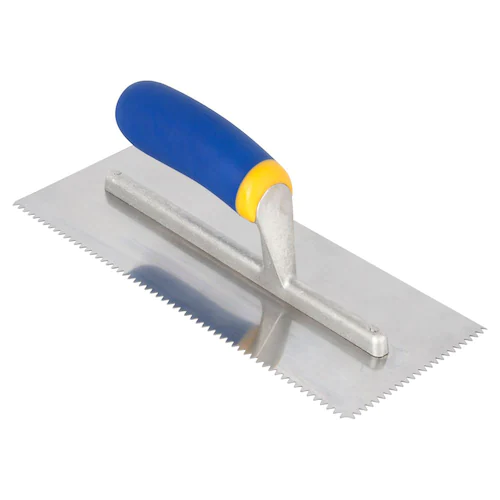Finding the Best Notched Trowel: A Comprehensive Review
When it comes to tiling projects, using the right tools is crucial for achieving a professional finish. A notched trowel is one such indispensable tool that ensures proper adhesive application, helping tiles adhere firmly to the surface. With numerous options available on Amazon, finding the best notched trowel can be overwhelming. To ease your search, we’ve compiled a list of the top 5 notched trowel products, along with their pros and cons, to assist you in making an informed decision.
Top Picks for Best Notched Trowel
MARSHALLTOWN MT79 Notched Trowel
The MARSHALLTOWN MT79 Notched Trowel is a high-quality product, constructed with a durable stainless steel blade and a comfortable DuraSoft handle. It boasts V-shaped notches for better adhesive distribution and is suitable for a wide range of tile sizes.
Pros:
- Durable stainless steel blade ensures longevity.
- Comfortable grip reduces hand fatigue during extended use.
- Precise V-shaped notches for consistent adhesive application.
- Versatile and suitable for various tile sizes and materials.
- Easy to clean and maintain.
Cons:
- The handle may feel a bit bulky for users with smaller hands.
QEP 42114 Notched Trowel
The QEP 42114 Notched Trowel is a compact and affordable option, perfect for DIY enthusiasts and small tiling projects. It features a sturdy steel blade and a contoured, cushioned grip for improved control.
Pros:
- Affordable and budget-friendly.
- Compact size is ideal for tight spaces and intricate jobs.
- Contoured grip enhances handling and reduces strain.
- Suitable for small-scale projects and mosaic tiles.
- Easy to store and transport.
Cons:
- Not ideal for large-format tiles due to its small size.
- The blade may not be as durable as some higher-end options.
Schluter Kerdi 1/8” by 1/8” Square Notch Trowel
The Schluter Kerdi 1/8” by 1/8” Square Notch Trowel is a reliable choice for professionals and serious DIYers. It features a corrosion-resistant, high-quality steel blade and an ergonomic, non-slip handle for comfortable use.
Pros:
- Sturdy construction ensures long-lasting performance.
- Ergonomic handle reduces hand strain and improves grip.
- Square notches provide excellent adhesive distribution.
- Ideal for medium to large-format tiles.
- Suitable for both thin-set and thick-set adhesives.
Cons:
- Slightly higher price point compared to some other options.
M-D Building Products 49100 Notched Trowel
The M-D Building Products 49100 Notched Trowel is a versatile tool that caters to various tiling needs. Its 1/4-inch notches are suitable for a wide range of tile sizes, making it a reliable option for both beginners and experienced tilers.
Pros:
- Cost-effective and suitable for budget-conscious buyers.
- Versatile 1/4-inch notches for various tile sizes.
- Lightweight design for easy maneuverability.
- Durable blade and handle construction.
- Ideal for DIYers and light professional use.
Cons:
- The handle may not be as comfortable as some premium models.
- May not withstand heavy-duty professional use.
Goldblatt Square Notch Trowel
The Goldblatt Square Notch Trowel is a heavy-duty option for tackling large-scale tiling projects. It boasts a robust steel blade with square notches, ensuring even adhesive distribution and maximum tile adhesion.
Pros:
- Sturdy and durable construction for demanding tasks.
- Square notches provide consistent adhesive application.
- Ideal for heavy-duty projects and large-format tiles.
- Comfortable grip for extended use.
- Suitable for various adhesives and tile materials.
Cons:
- Higher price point compared to standard trowels.
- The larger size may not be suitable for intricate work.
Conclusion
When it comes to tiling projects, a high-quality notched trowel can make all the difference in achieving a flawless finish. Each of the five products mentioned above offers unique features to suit different needs and preferences. Whichever product you choose, these top-notch notched trowels will undoubtedly help you master your tile installation with ease and confidence.
What Should You Look for in a Notched Trowel?
When choosing a notched trowel, there are several key factors to consider to ensure you get the right tool for your tiling project. Here’s what you should look for in a notched trowel:
- Notch Size and Shape: Notched trowels come with various notch sizes and shapes, such as square, U-shaped, V-shaped, and more. The size of the notches determines the amount of adhesive applied to the tile and the substrate. Consider the type and size of tiles you’ll be working with and match the notch size accordingly. Larger tiles generally require larger notches.
- Material of the Blade: The blade material directly impacts the trowel’s durability and performance. Stainless steel blades are more resistant to corrosion and wear, making them a popular choice for their longevity and ease of cleaning. Some trowels also come with tempered or carbon steel blades, which are more budget-friendly but may require more maintenance to prevent rusting.
- Handle Comfort and Grip: Since tiling projects can be time-consuming, a comfortable handle with a good grip is essential. Look for trowels with ergonomic handles that reduce hand fatigue and provide better control during use. Many trowels come with cushioned or rubberized handles for improved comfort.
- Blade Flexibility: The flexibility of the blade affects how well the trowel spreads the adhesive and how well it follows any contours or unevenness in the substrate. A more flexible blade can be advantageous when working on uneven surfaces or when using thick adhesives.
- Brand and Quality: Opt for trowels from reputable brands known for their quality construction and reliability. Trusted brands are more likely to offer trowels made from high-quality materials, ensuring they perform well and last longer.
- Intended Use: Consider the scale and type of tiling project you’ll be working on. For small DIY projects or mosaic tiles, a compact trowel with smaller notches may be sufficient. On the other hand, larger tiling jobs or heavier tiles may require a heavy-duty trowel with larger notches.
- Budget: Notched trowels come in a range of price points, so consider your budget and balance it with the level of quality and features you need. It’s generally worth investing in a higher-quality trowel if you’ll be using it frequently or for professional projects.
- Compatibility with Adhesive and Tile Material: Ensure that the trowel you choose is suitable for the type of adhesive you plan to use, whether it’s thin-set or thick-set mortar. Additionally, consider the type of tile material you’ll be working with, as certain materials may require specific notched trowel types.
By carefully considering these factors, you can select the most appropriate notched trowel that suits your needs and ensures a successful and efficient tiling project.
Frequently Asked Questions
Does trowel notch size matter?
Yes, the trowel notch size does matter when it comes to tiling projects. Notch size directly influences the amount of adhesive or mortar applied to the back of the tile and the substrate during the installation process. Choosing the correct notch size is essential for achieving proper tile adhesion and a successful tiling job.
The general rule of thumb is that larger tiles require larger notches, while smaller tiles need smaller notches. Here’s why the notch size matters:
- Adequate Adhesive Coverage: The notches on the trowel create ridges in the adhesive, which help to distribute the mortar evenly and create a strong bond between the tile and the substrate. Using the right notch size ensures that there is sufficient adhesive coverage on the back of the tile, preventing air pockets and ensuring a secure bond.
- Minimizing Tile Slippage: Proper notch size helps prevent tile slippage during the installation process. If the notches are too small, there might not be enough adhesive to hold the tile in place, leading to uneven tile placement and potential movement during setting.
- Reducing Lippage: Lippage refers to the uneven surface between adjacent tiles. Using the correct notch size helps minimize lippage by ensuring that the tiles are set at an even level.
- Avoiding Excess Mortar Squeeze-Out: Using a trowel with excessively large notches may cause an excess amount of mortar to squeeze out from under the tile edges, making the cleanup process more challenging and potentially affecting the tile’s alignment.
- Proper Setting Time: The amount of adhesive applied with the trowel notch directly affects the time needed for the tiles to set. Using the correct notch size ensures that the tiles adhere properly without excessive drying or setting time.
When choosing the notch size, consider the size and type of tiles you are installing, the type of adhesive or mortar being used, and the surface conditions. Different types of tiles and adhesives may have specific recommendations regarding notch sizes, so always follow the manufacturer’s guidelines for optimal results.
In summary, the trowel notch size does matter, as it significantly impacts the success of your tiling project. Properly sized notches ensure adequate adhesive coverage, minimize tile slippage and lippage, and contribute to a professional-looking tile installation.
What is the best sized notched trowel?
The best sized notched trowel depends on the specific tile size and type, as well as the adhesive or mortar being used. Different tiling projects may require different notch sizes to achieve optimal adhesive coverage and tile adhesion. Here are some general guidelines to help you choose the best-sized notched trowel for common tile sizes:
- 1/4-inch Notched Trowel: This size is suitable for small tiles, such as mosaic tiles, with dimensions up to 4 inches. It is commonly used for wall tiles and small floor tiles.
- 3/16-inch Notched Trowel: Ideal for small to medium-sized tiles, including ceramic and porcelain tiles with dimensions up to 6 inches. It works well for most standard wall and floor tiles.
- 1/4-inch x 3/8-inch Notched Trowel: This size is a good choice for medium-sized tiles with dimensions up to 8 inches. It is commonly used for tiles that require a bit more adhesive to ensure proper adhesion.
- 1/2-inch Notched Trowel: Suitable for larger tiles, such as natural stone tiles, with dimensions up to 16 inches. This notch size is often used for heavy-duty applications and large-format tiles.
It’s essential to check the manufacturer’s recommendations for the tile and adhesive being used, as they may have specific notch size requirements. The tile packaging or the adhesive manufacturer’s instructions usually indicate the appropriate notch size for that particular tile-adhesive combination.
Additionally, consider the substrate condition and flatness. If the surface is uneven, you may need a larger notch size to accommodate the irregularities and ensure proper coverage.
When in doubt, it’s a good idea to do a test layout with a few tiles and different trowel notch sizes to see which one provides the best coverage and adhesion without excessive mortar squeezing out from under the tiles.
Ultimately, the best-sized notched trowel is the one that matches the tile size, adhesive type, and substrate condition, ensuring a successful and professional-looking tile installation.
Should I use V notch or square trowel?
Whether to use a V-notch or square-notch trowel depends on the type of tile you are installing and the adhesive or mortar being used. Each type of trowel creates different patterns of ridges in the adhesive, affecting the amount of coverage and how the tile adheres to the substrate. Here’s a comparison of V-notch and square-notch trowels to help you make an informed decision:
V-Notch Trowel:
- Advantages:
- Provides better adhesive distribution due to the V-shaped notches, which help to spread the mortar evenly.
- Ideal for tiles that may have minor irregularities or uneven surfaces, as the V-notches can accommodate and level out small imperfections.
- Suitable for thin-set adhesives used with most standard ceramic and porcelain tiles.
- Best Use:
- V-notch trowels are typically recommended for small to medium-sized tiles with relatively flat backs, such as ceramic and porcelain tiles.
Square-Notch Trowel:
- Advantages:
- Creates uniform ridges in the adhesive, resulting in consistent tile height and alignment.
- Ideal for large tiles or tiles with varying thicknesses, as the square notches help prevent tile slippage and maintain an even surface.
- Suitable for both thin-set and thick-set adhesives.
- Best Use:
- Square-notch trowels are commonly used for medium to large-sized tiles, natural stone tiles, glass tiles, and other tiles that may require a bit more adhesive for proper adhesion.
Choosing Between V-Notch and Square-Notch Trowel:
- Tile Size: For smaller tiles, a V-notch trowel may be more suitable to ensure adequate adhesive coverage and help level out minor tile irregularities. For larger tiles, especially those with varying thicknesses, a square-notch trowel provides better support and prevents slippage.
- Tile Type: Consider the type of tile you are installing. For most standard ceramic and porcelain tiles, a V-notch trowel is commonly used. However, if you are working with natural stone tiles or other tiles with varying thicknesses, a square-notch trowel may be the better choice.
- Adhesive Type: Both V-notch and square-notch trowels can work with both thin-set and thick-set adhesives. However, if you are using thick-set mortar, a square-notch trowel may be more appropriate for its ability to hold more adhesive.
- Surface Condition: If the substrate is relatively flat and even, either trowel type can work well. However, if the surface has significant irregularities, a V-notch trowel’s ability to level out small imperfections may be advantageous.
In summary, consider the size and type of tile, the adhesive being used, and the substrate condition when choosing between a V-notch and square-notch trowel. Both trowel types have their advantages, and selecting the appropriate one will help ensure a successful and reliable tile installation.
editor's pick
news via inbox
Stay one step ahead with exclusive tips, guides, and offers delivered directly to your inbox.
Sign up for our newsletter and elevate your home improvement game today!







